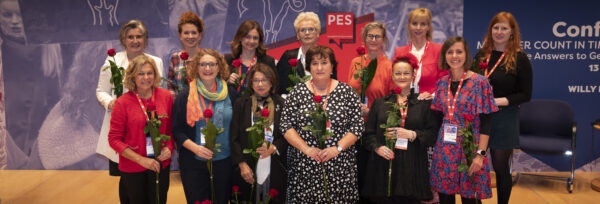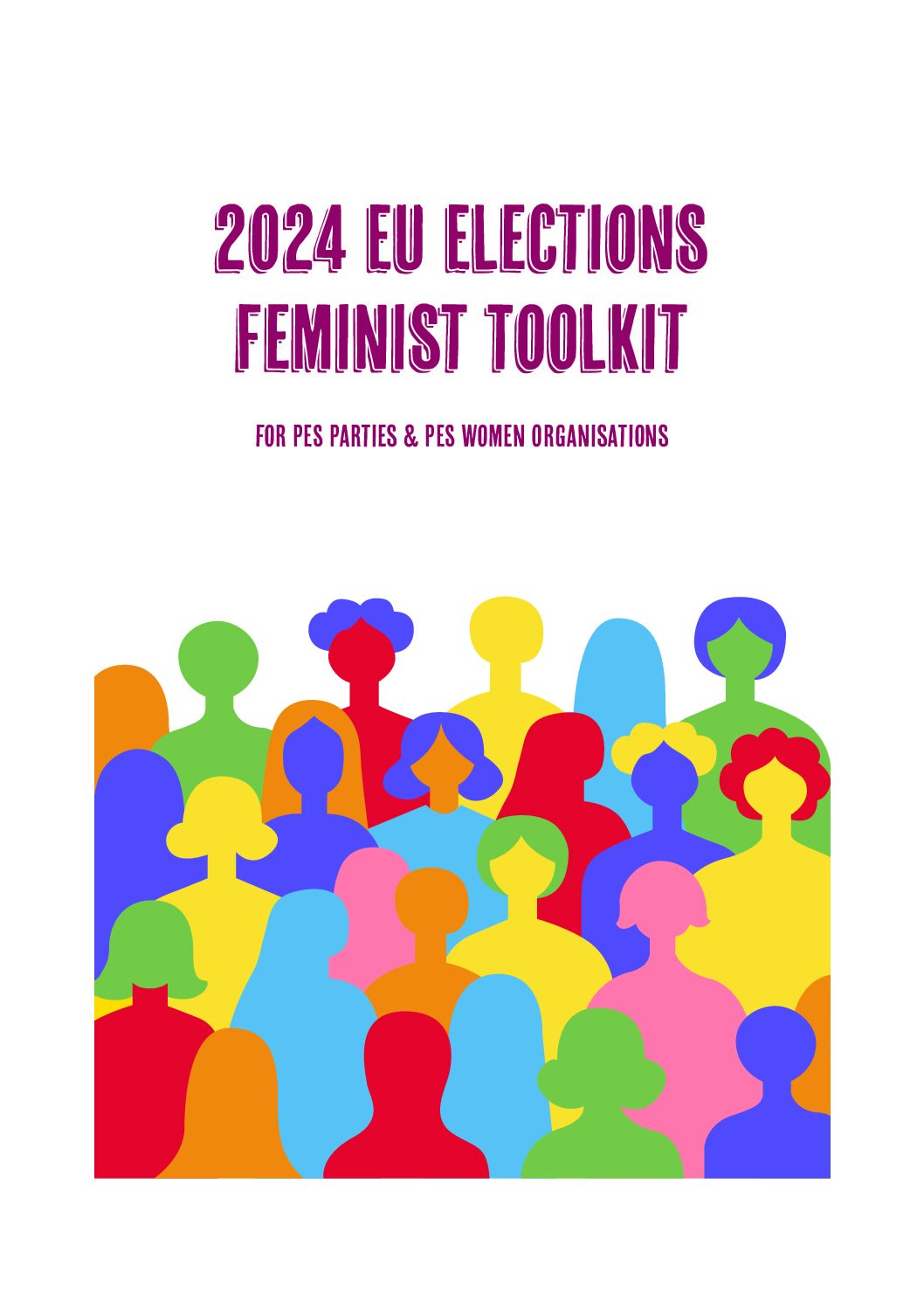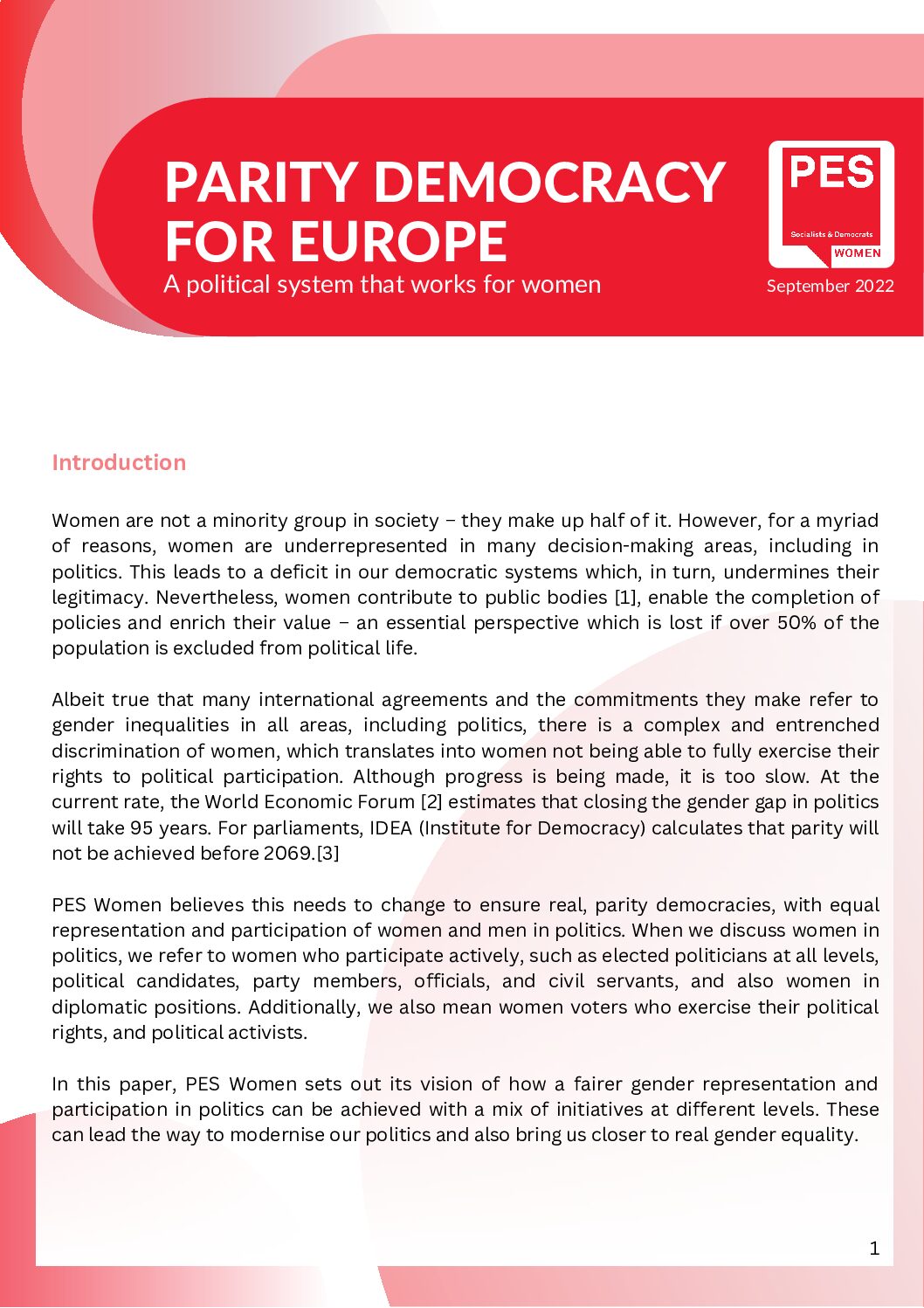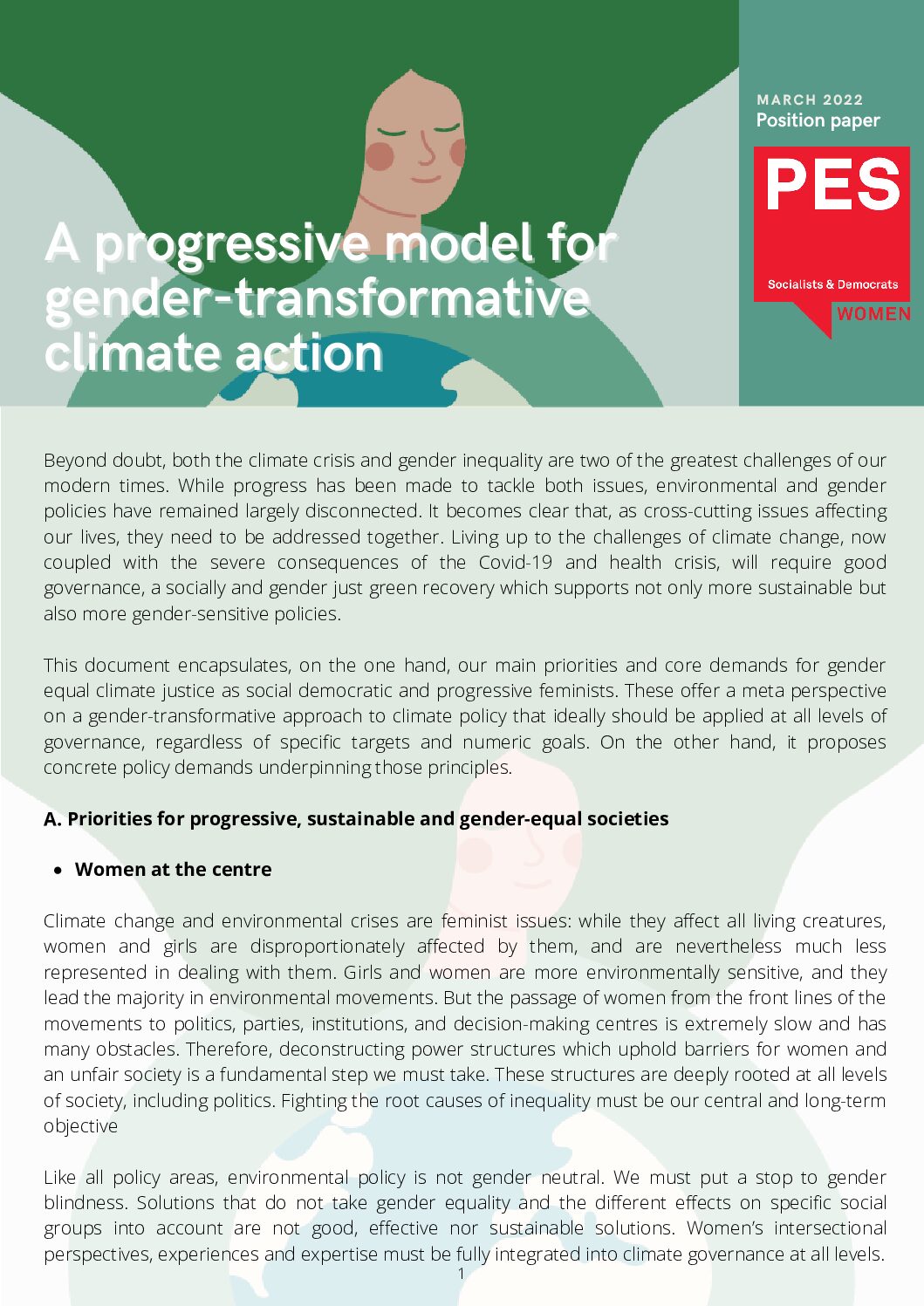About
PES Women is the women’s organisation of the Party of European Socialists (PES) promoting gender equality and women’s rights both inside and outside the party.
PES Women is made up of representatives from all 32 PES member parties and has its own political structure and resources with an executive bureau, which is made up of its members, the President and four Vice-Presidents, each representing a different region in Europe.
PES Women is fighting for a gender just and feminist Europe by giving a voice, tools and platform for women, by putting forward specific women’s rights policies, through gender-mainstreaming the overall policy-making of the Social Democratic family and by ensuring equal representation in the PES bodies, member parties and organisations.
We believe that women’s rights and gender equality go beyond borders. While women around the world experience different challenges that are particular to their context, there are also common challenges of representation, participation and guaranteeing fundamental rights and freedoms for women. We show solidarity and cooperate closely with progressive advocates for women’s rights all over Europe and around the world, to put gender equality at the top of the political agenda and to strengthen the global feminist movement.
Our priorities
-
Combatting gender-based violence
Gender-based violence (GBV) is the most extreme expression of unequal gender relations in society. Over half of women are experiencing sexual harassment and 1 in 3 women in the EU has been a victim of physical and/or sexual violence.
Gender-based violence is a global public health issue and a structural phenomenon that transcends social, economic or national boundaries. It represents a major obstacle for the achievement of gender equality and sustainable development, posing a serious threat to democratic development. It is a serious violation of human rights and remains widely unsanctioned. Combatting any form of GBV should not lay on the shoulders of women, instead, institutions, policies and judicial systems must be strengthened and held responsible.
-
Closing the gender gaps through a feminist economy
Gender equality is not just a woman’s issue, but for the benefit of everyone, breaking down patriarchal pillars and power structures in our societies. Policies and legislations need to be intersectional and thus tailored to the different circumstances and requirements of people, so that equality is the ultimate goal. The aim must be to improve all rights for all women, and not just the privileged ones. This means paying attention and considering the challenges of those who have special requirements, who represent multiple minorities, or who face multiple disadvantages.
-
Access to the fundamental rights
Next to economic rights such as equal pay, employment and decent work for all women in Europe, it is necessary to ensure women’s political rights. This can only be guaranteed by providing equal access and participation in decision-making and by creating gender-responsive institutions which apply gender-mainstreaming and a holistic approach to their work.
All over the world, women are discriminated against and arrested, simply for making choices about their bodies and lives. The principle ‘My body my rights’ must be guaranteed by providing legal information, education and accessible health care that is equal for all women across Europe, including the full range of sexual and reproductive health and rights.
-
All rights for all women
Gender equality is not just a woman’s issue, but for the benefit of everyone, breaking down patriarchal pillars and power structures in our societies. Policies and legislations need to be intersectional and thus tailored to the different circumstances and requirements of people, so that equality is the ultimate goal. The aim must be to improve all rights for all women, and not just the privileged ones. This means paying attention and considering the challenges of those who have special requirements, who represent multiple minorities, or who face multiple disadvantages.
News
More newsDocuments
More documentsPES Women member organisations
- Austria: SPÖ Frauen (Social Democratic Women), SPÖ
- Belgium: Zij Kant, SpA
- Belgium: Commission Interfédérale des Femmes (Inter-federal Women’s commission), PS
- Bulgaria: Обединение на жените-социалистки (Bulgaria Union of Socialist Women), BSP
- Croatia: Socijaldemokratski Forum Žena (Croatia Social Democratic Women’s Forum), SDP
- Czech Rep: Sociálně demokratické ženy (Czech Republic Social democratic women), CSSD
- Cyprus: Σοσιαλιστική Γυναικεία Κίνηση (Cyprus Socialists Women’s Movement), EDEK
- Denmark: Socialdemokratiets Udvalg for Køn og Ligestilling (Committee of Gender and Equality) and Helga Network, SD
- Estonia: Naiskogu Kadri (Women Association Kadri), SDE
- Finland: Sosialidemokraattiset Naiset (Finland Social Democratic Women), SDP
- France: Secretariat National au droit de la femme (National Secretariat for Women’s rights), PS
- Germany: Arbeitsgemeinschaft Sozialdemokratischer Frauen der SPD (Working group of social democratic women in the SPD)
- Greece: ΠΑΣΟΚ Τμήμα Ισότητας των φύλων (Department of Gender Equality), PASOK
- Hungary: MSZP Nőtagozata (HSP Women organisation), MSZP
- Iceland: Kvennahreyfing Samfylkingarinnar (Iceland Social democratic Women’s Network), SDA
- Ireland: Labour Women, Labour Party
- Italy: Commissione delle donne (Women’s Commission), PSI
- Lithuania: Lietuvo Socialdemokraciu Moteru Sajunga (Lithuanian Social Democratic Women’s Union), LSDP
- Luxemburg: Femmes Socialistes (Luxembourg Socialist Women), LSAP
- Malta: Nisa Laburisti (Women’s Labour), PL
- Netherlands: Rooie Vrouwen in de PvdA (Red Women in the PvDA)
- Northern Ireland: Social Democratic and Labour Party Women, SDLP
- Norway: Arbeiderpartiets Kvinnenettverk (The Norwegian Labour Party Women’s Network), DNA
- Portugal: Mulheres Socialistas – Igualdade e Direitos (Socialist Women – Equality and Rights), PS
- Romania: Organizatia de Femei a PSD (Romania Women Organisation of the PSD)
- Slovenia: Ženski forum Socialnih demokratov (SD Slovenia Women Forum), SD
- Spain: Secretaría para la igualdad (Secretariat for Equality), PSOE
- Sweden: S-kvinnor (Social Democratic Women in Sweden), SD
- Switzerland: Sozialdemokratische Frauen der Schweiz (Switzerland Social Democratic Women of Switzerland), SDP
- UK: Labour Women’s network – Labour Party
- Turkey: CHP Kadın Kolları (CHP Women)
Ex-officio member organisations
- YES (Young European Socialists)
- FEPS (Foundation for European Progressive Studies)
- PES Group in the European Committee of the Regions
- S&D Group – FEMM Committee






